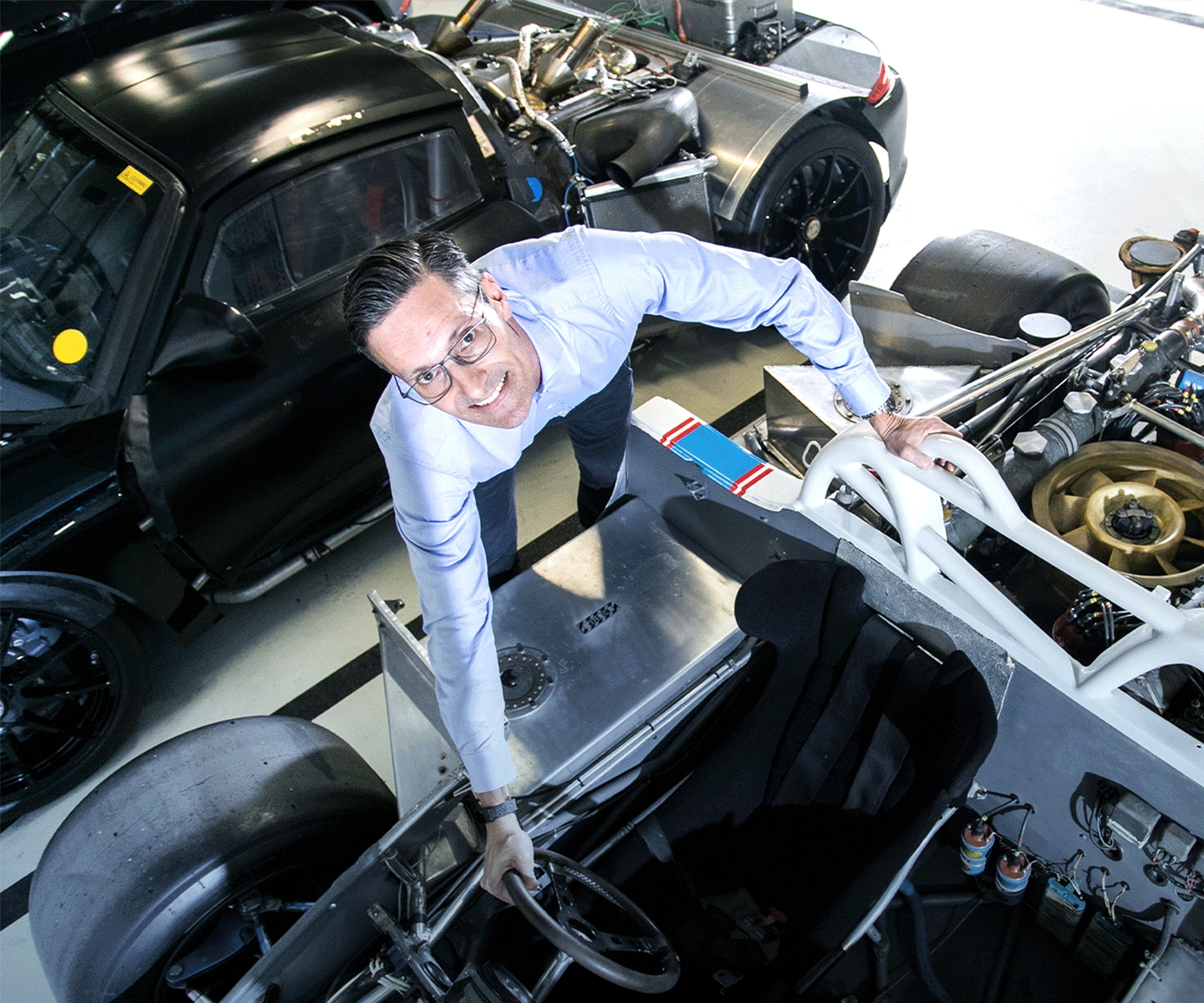Pioneering spirit
Engine developer Dr André Casal Kulzer likes to break new ground and thus continues the tradition of his family. We met him in the Porsche Museum in Stuttgart-Zuffenhausen, alongside world-famous, iconic vehicles such as the 356, 911 or 917 and many other small exhibits.
Names carry traces of the past
And this is certainly the case for André Casal Kulzer. The Bavarian “Kulzer” takes us back to a former agricultural machinery factory in Velden, founded by his great-grandfather. ›Casal‹, meanwhile, refers to his mother, the daughter of a Portuguese motorcycle manufacturer. His parents met as the result of a pioneering act: after the foundation of Metalurgia Casal in 1964, the two-stroke engines were initially supplied by Zündapp, but technical expertise was desperately needed on site. Kulzer’s father was one of the four German engineers that Zündapp sent to Aveiro, an industrial city in the north of Portugal, which at the time was still regarded as a developing country. His father occupied various management positions in the motorcycle industry during the course of the 1970s. For young André, it was completely normal to wander around the site of the motorcycle factories. Occasionally he discovered retired mopeds and removed parts. When his busy father had some free time, he built model aircraft with his son. »That was my Lego«, comments Kulzer, remembering the time when he settled on his first big career wish: to be a fighter pilot or an astronaut.
The Portuguese economy increasingly opened up at the start of the 1980s. By this time, Casal had long since ceased to focus solely on mopeds for the domestic market, but rather exported and invested in the development of larger machines. The company’s participation in racing had become an important marketing instrument. André’s father also provided support in the development of racing engines, among other things through a rotary slide valve control unit, which enables very high engine speeds and thereby performance. He constantly took his son to competitions, keeping his passion for engines alive. When André realised that, as a top-class swimmer, he was physically fit, but could never be a fighter pilot due to having to wear glasses, there was only one route to follow: he wanted to develop engines and powertrains like his father and grandfather before him, and preferably in southern Germany. After completing his university entrance exams with very good grades, he graduated in mechanical engineering in Lisbon, including an Erasmus scholarship at the TU Braunschweig, and discovered his love of thermodynamics – a topic that many of his fellow students wanted to leave behind them as quickly as possible. Even today, Kulzer believes that »thermodynamics sometimes has something philosophical about it«.
Thermodynamics sometimes has something philosophical about it.
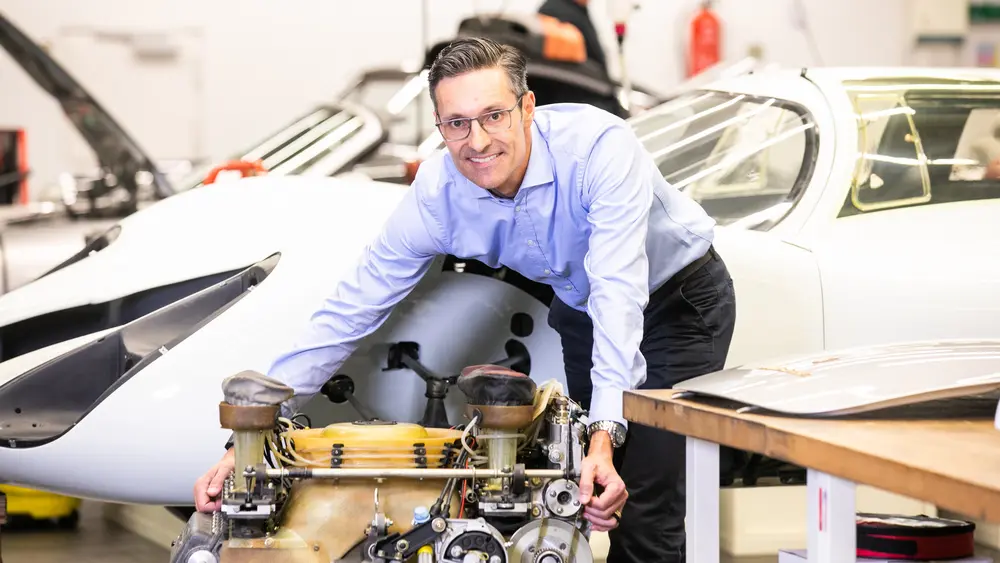
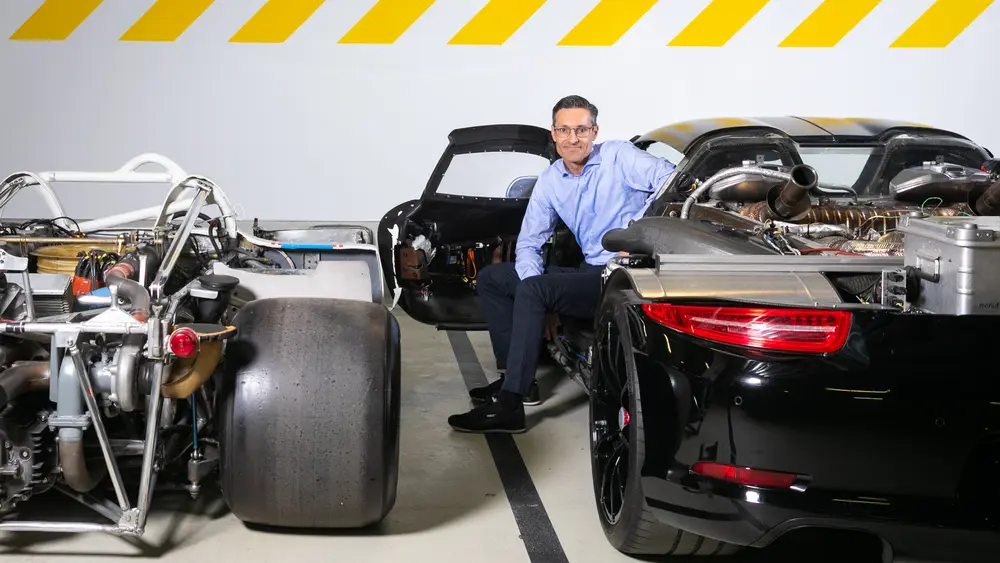
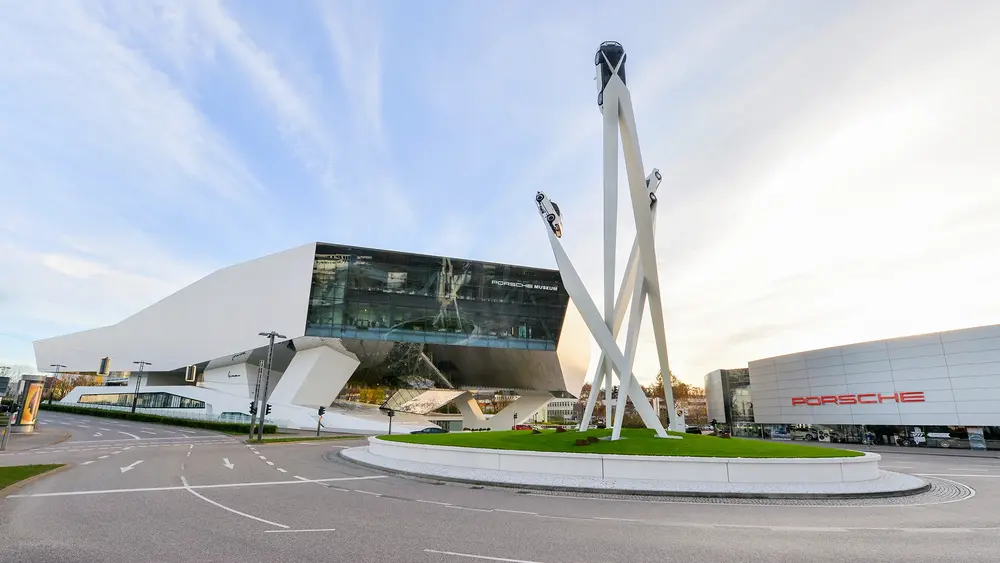
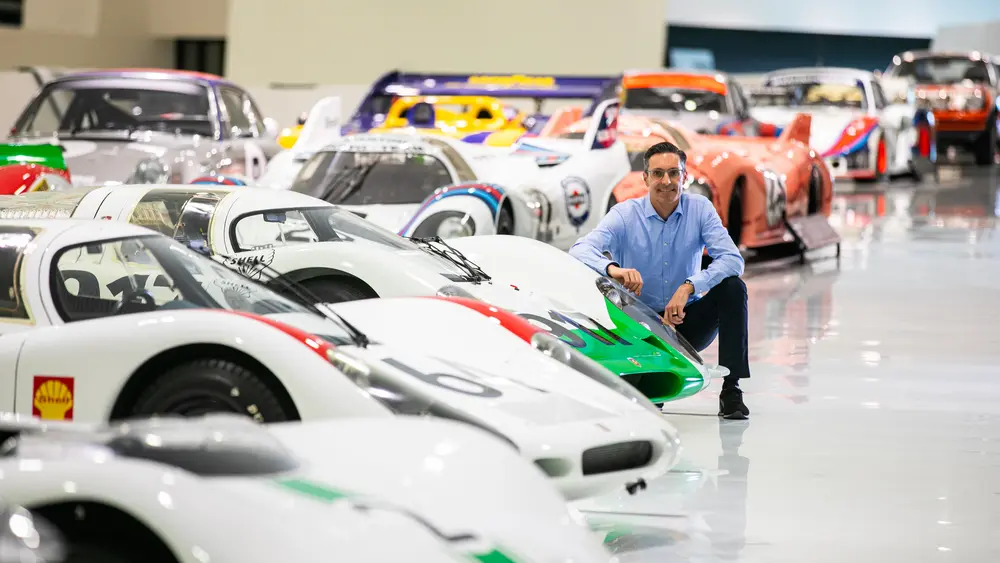
André Casal Kulzer in the workshop of the Porsche Museum, which keeps the manufacturer’s collection of classic vehicles roadworthy. The unique thing about the workshop is that visitors can watch the mechanics at work through windows.
After a brief period of orientation, Kulzer ultimately found a doctorate position at Bosch. The topic of the work conducted together with the University of Stuttgart was a challenging one: Kulzer looked for ways to start a spark-ignition engine directly – that is, without an electric starter. This can only work when the position of the pistons and the corresponding filling in the cylinder is known by shutting down the engine in a controlled manner, and when the carburation is precisely matched with the starting process. First, Kulzer spent a year developing theoretical simulation models capable of reproducing the entire start process, from carburation and combustion, up to torque balance. As test bench capacity was limited and expensive, Kulzer developed sensors and software on a Volkswagen Lupo. »It immediately started up the first time I attempted a direct start,« says Kulzer with a smile. During the rest of the project, however, it also became clear that a direct start is difficult to realise in warmed-up engines in particular. Nevertheless, Kulzer’s work sparked a great deal of interest in the industry, and as a young man he was invited to present his findings to nearly all well-known car manufacturers – often directly to the development board. Even though the car without an electric starter did not make it into series production, the research results are important as they enable the combustion engine in modern hybrid vehicles to be restarted with the car occupants barely noticing. Kulzer’s superior at Bosch guaranteed him a permanent post a year before be earned his doctorate. The young engineer started in research in 2003, where he worked on new combustion processes. One of these was compression ignition, which was discussed intensively at the time. »I had a lot of freedom and was constantly permitted to break completely new ground,« remembers Kulzer. It was also then that he established his initial contact with the FVV research association. He later switched internally to pre-development in the Gasoline Systems segment and was actually very satisfied there.
Power density and performance are still important development goals for Porsche.
Yet he signed on the dotted line for Porsche in 2012. He was convinced by his then superior, who told him: »80% of the developments we work on make it into series production.« Since then, he has been responsible for thermodynamics pre-development at the sports car manufacturer. This is a cross-disciplinary function, as Kulzer works on both electrified powertrains and pure GT engines. »Power density and performance remain important development goals for Porsche,« comments the expert. »But of course there is a growing focus on drastically reducing emissions and taking the entire product life cycle into account when working on future powertrain generations.«
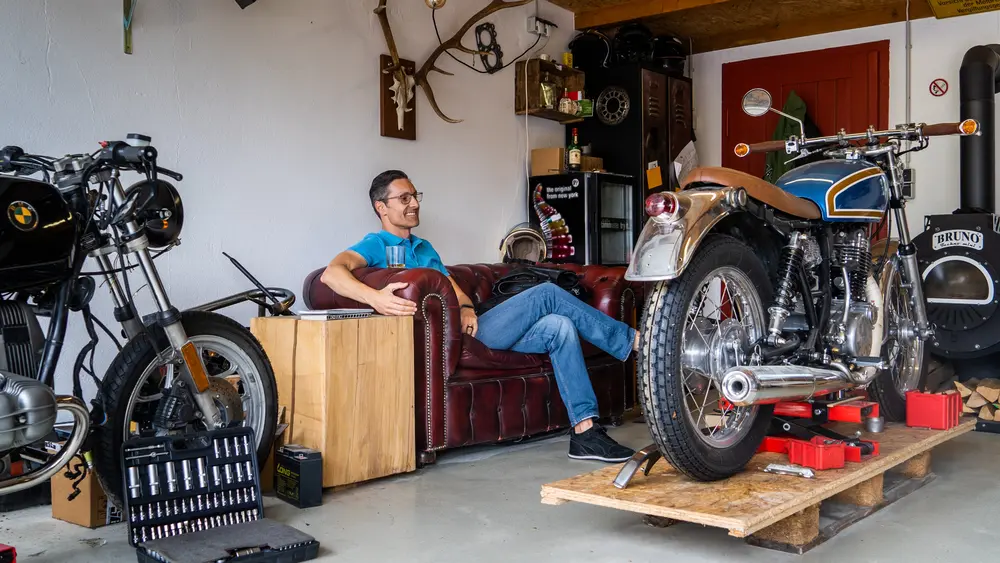
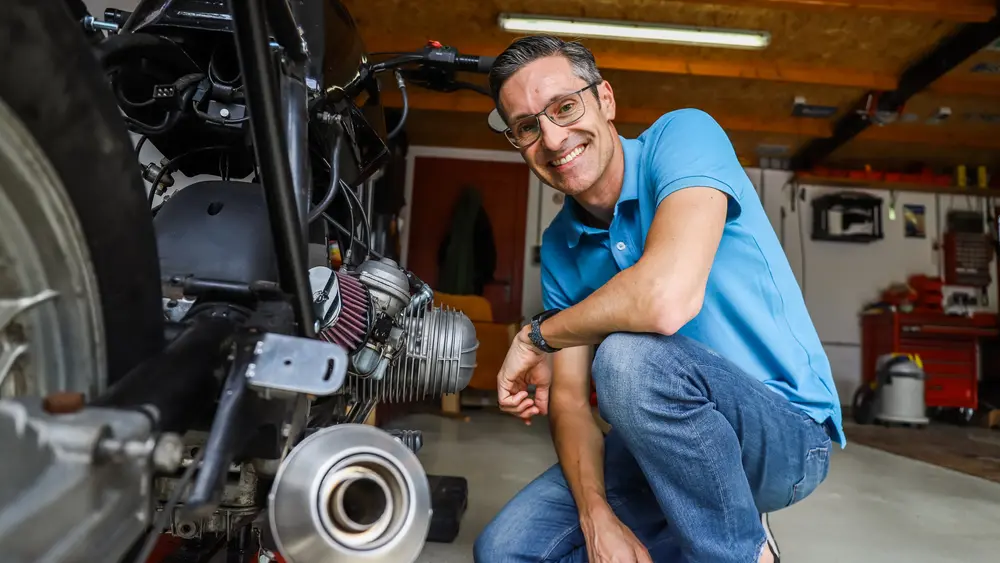
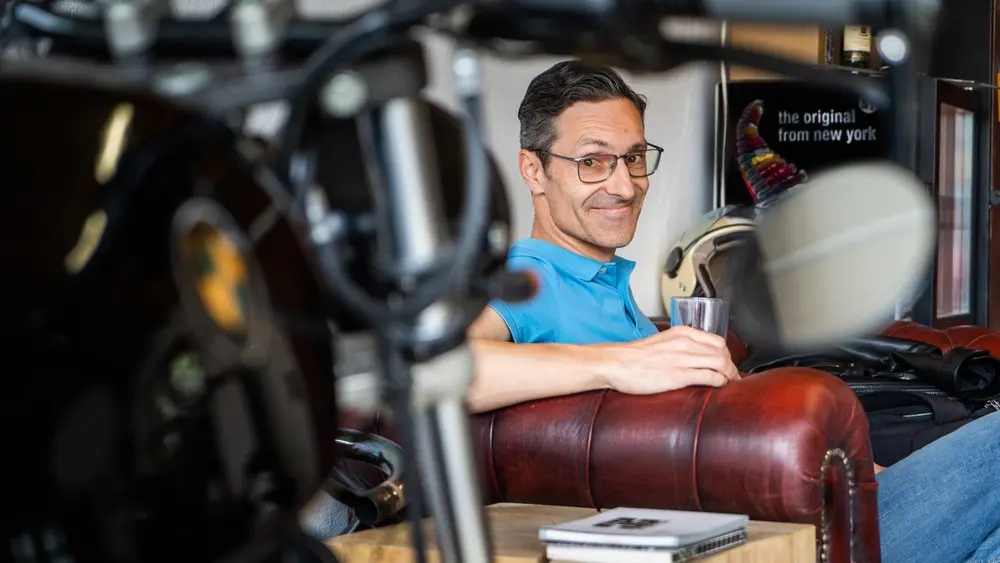
Kulzer restores old motorcycles in his spare time.
This also revives memories of the days when his father developed racing motorbikes for Casal.
Kulzer has also represented Porsche in numerous FVV research projects aimed at resolving this balancing act. He initiated a now completed project in which various water injection methods were investigated – an important topic for reducing emissions in high-load operation through maximum efficiency. He is also project co-coordinator for the ›ICE2025+‹ project, in which four renowned universities are working together to increase the efficiency of spark-ignition engines.
Looking to the future and tackling new things with a pioneering spirit is probably Casal Kulzer’s most important inheritance from his family history. Two roadworthy Casal series motorcycles in his garage remind him of this. It is a matter of pride that he maintains them himself. //
Dr.-Ing. André Casal Kulzer was born in 1975 and has been responsible for thermodynamics in advanced powertrain engineering at Porsche since 2012. The mechanical engineer, who earned his doctorate at the University of Stuttgart, worked at Bosch for nine years prior to this.
He is involved in numerous working groups at the FVV and frequently initiates new research projects. He also serves on the Scientific Advisory Committee and the Research Committee. Since May 2020, Dr Kulzer has been in charge of Planning Group 2 »Combustion SI« in the Engines research area.
